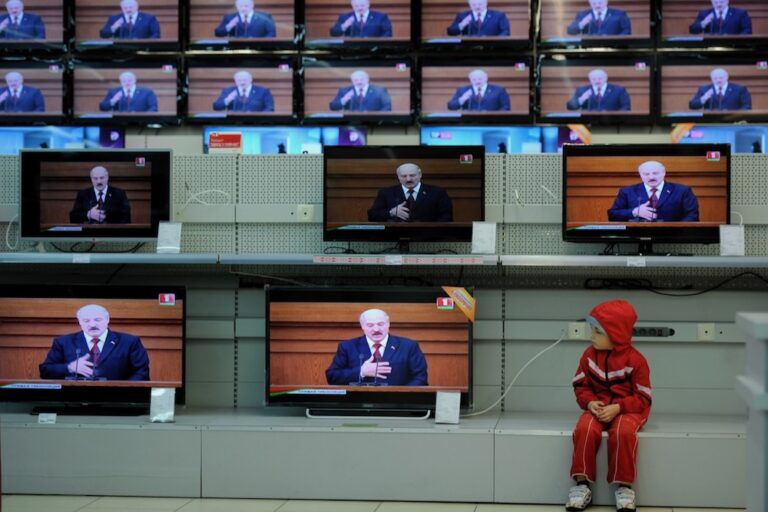(RSF/IFEX) – Four years after the disappearance of Dmitri Zavadski on 7 July 2000 and with the investigation now closed, those responsible have still not been found and the possible implication of the highest levels of government has still not been properly investigated. The young cameraman’s body has never been recovered and aspects of the […]
(RSF/IFEX) – Four years after the disappearance of Dmitri Zavadski on 7 July 2000 and with the investigation now closed, those responsible have still not been found and the possible implication of the highest levels of government has still not been properly investigated.
The young cameraman’s body has never been recovered and aspects of the case remain unclear despite the conviction in 2002 of two members of the Interior Ministry’s special units.
RSF and the Belarus Association of Journalists (BAJ) have expressed their outrage at the determination of the authorities to do everything in their power to cover up the truth.
“The evidence of the authorities’ involvement in the disappearance of Dmitri Zavadski is overwhelming. If Belarus hopes to one day join the Council of Europe it must hold an independent investigation to establish guilt in this case,” the two press freedom organisations said.
RSF and the BAJ welcomed the Parliamentary Assembly of the Council of Europe’s (PACE) work on the case and their recent finding of the Belarusian authorities’ implication in Zavadski’s disappearance.
On 28 April 2004, the PACE called on the international community to “exert maximum political pressure on the current leadership of Belarus, including through sanctions,” to obtain an independent investigation into the disappearance of four people between 1999 and 2000. The individuals named were former interior minister Yuri Zakharenko, former parliamentary deputy speaker Victor Gonchar, businessman Anatoly Krassovski and Zavadski.
“The information gathered by the rapporteur leads one to believe that steps were taken at the highest level of the state to actively cover up the true circumstances of these disappearances, and to suspect that senior officials of the state may themselves be involved in the disappearances,” the assembly concluded.
The Council of Europe’s special rapporteur for Europe, Christos Pourgourides, in a report published in January 2004, raised serious suspicions about the involvement of three officials in numerous disappearances, including that of Zavadski. The officials named were Prosecutor-General Viktor Sheiman, the former head of the National Security Council, Minister for Sports and Tourism Yuri Sivakov, who was the interior minister at the time of the disappearances, and Dmitri Pavlichenko, commander of a police special unit.
RSF and the BAJ support in particular the following demands:
– the resignation of Prosecutor-General Sheiman, due to an unacceptable conflict of interest;
– the opening of an independent criminal investigation with, as a priority, the examination of the roles played by Sheiman, Sivakov and Pavlichenko in the disappearances;
– the examination of the responsibilities of several high-ranking officials in the obstruction of justice to protect the true perpetrators of the crimes;
– regular reporting on the progress and results of the investigation to the missing journalist’s family.
In early April 2004, Svetlana Zavadskaya, wife of the missing journalist, received a letter telling her that the investigation into her husband’s disappearance had been closed because “the missing individual [had] not been found.” The Prosecutor General’s Office had closed the investigation once before, on 27 February 2003, before reopening it on 10 December. No official explanation was provided other than “the need to pursue enquiries”.
RSF and the BAJ have in vain asked Prosecutor-General Sheiman to provide Zavadski’s family with a written explanation of why the officer in charge of the case, Ivan Branchel, decided to close the investigation.
The organisations also called on the prosecutor’s office to list what steps had been taken to find the journalist, but also what inquiries had initially been planned but were not pursued and why.
RSF and the BAJ felt the family had the right to know if the two members of the Interior Ministry’s special services, who were convicted in the kidnapping following a closed trial before the Supreme Court, had pleaded guilty to the charges and whether they had provided any information on the journalist’s fate after the kidnapping or on the possible location of his body.
The family also does not know if accomplices to the abduction referred to during the trial have been identified and if they have been able to provide any information on the case.
The KGB has not responded to a request from the wives of the four missing men, including Zavadskaya, asking them to take action against high-ranking officials suspected of links to the crimes.


